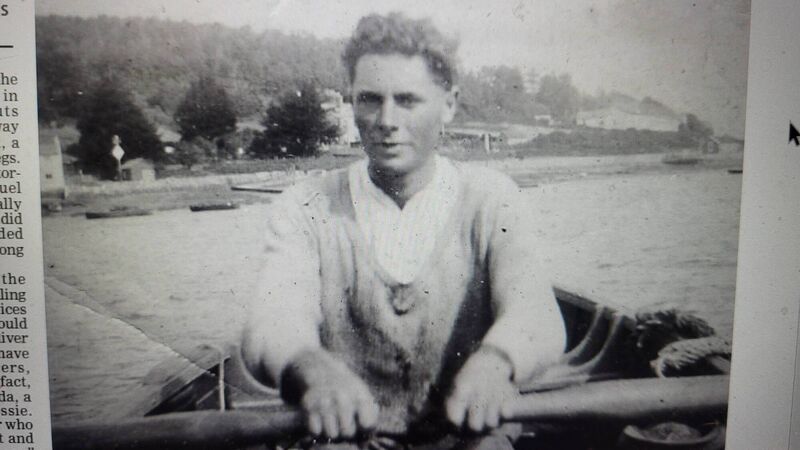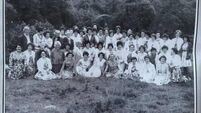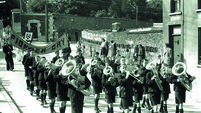Ferryman Mossie’s 30-years a-rowing in Cork city

Ferryman Mossie Good, who plied his trade across the Owenabue estuary between 1932 and 1962
FOR 30 years, a ferryman rowed his boat across the Owenabue estuary, connecting people to place, vendor to buyer, rich to poor, Catholic to Protestant, upstairs to downstairs, and past to present.
Between 1932 and 1962, Mossie Good’s 14ft and 16ft wooden rowboats provided a vital exchange of passengers and cargo from Cork’s lower harbour to the seaside village of Crosshaven.
The era witnessed some of the most monumental events of the 20th century, but he remained a constant feature on the river.
A fare of tuppence would grant passage to patrons of all class, status and creed, and the ferry operated seven days a week.
The first run was at 7.30am on weekdays to take tradesmen and shipwrights from Ringaskiddy, who would cycle to the ferry for work in Crosshaven boatyard.
In the summer, the last run at the weekends was midnight to bring people home from dances.
“My father was known as Mossie the Ferryman. He was a rogue and a character,” said his son Denis Good. “The busiest day of his week was Sunday. He would do a 10am run for Catholic mass and an 11am run for Church of Ireland. He’d leave them a bit of time to get a few essentials in the shops afterwards and regularly nip into Buckley’s for a pint of porter and a puff off his pipe between trips.”
Denis followed on from his father in his own way, and he and his son Donagh own The Good Fish Company, one of the largest fish processors in Ireland.
In total, the ferry service at Currabinny spanned 100 years. It was first run by the Conway and Buttimer families, and from 1902 it was used predominately to link up with the Crosshaven railway, conveying passengers and goods to meet outgoing and incoming trains.
After the closure of the line in 1932, Mossie and his brother Denis took over the running of the ferry when they brought the licence and equipment for £100, to be paid by quarterly instalments of £5.
A wooden kiosk with a half door was erected to provide shelter for the boatman and to store parcels.
“In those days, Currabinny was very isolated,” said Denis. “The roads were no more than country lanes with grass growing up the middle. I travelled to school in Ringaskiddy via short-cuts through the fields. The only way in or out was on a rowboat, a pony and trap, or your two legs.
“Even if you did have a motor car, which was very rare, fuel was hard to come by, especially during the war years. Mossie did a booming trade then,” added Denis, like his father, a life-long resident of Currabinny.
“The ferry was used by the postman and labourers travelling to the big houses here. Services like the baker and laundry would come over once a week to deliver and sell their wares. You’d have people working as cleaners, gardeners and nannies. In fact, that’s how my mother Breda, a Limerick woman, met Mossie. She was a farmer’s daughter who came from Newcastle West and worked in one of the big houses,”
Known for its woodland walks, Currabinny is situated on a promontory overlooking Cork Harbour and sitting directly opposite Crosshaven.
The grand villas, manor house and terrace close to the pier on the south-eastern side of the hill were built in the 1860s after ads appeared in the Cork Constitution newspaper promoting “marine residences rarely to be met with”.
Potential buyers were briefed that “the best of taste will be employed to correspond to the natural beauty and present a picture which would be hard to match in Her Majesty’s Dominions”.
The houses were reserved for “persons of the highest respectability”. Some had a stipulation prohibiting “the carrying out of business of a farmer or alehouse keeper, chandler, baker, butcher or any other noisy or obnoxious trade or business whatsoever”.
In 1863, the Cork Harbour Commissioners erected a pier at which steamers en route from the city, Queenstown (Cobh) and Passage West would call to deliver building materials.
As well as private tennis courts and stables, the 90-acre woodland (now a public amenity maintained by Coillte) was private property forming a ‘charming pleasure ground’ for the occupants of the neighbourhood.
The woods was crowned by an elegant stone octagon overlooking the formidable Fort Camden and Fort Carlisle. From this scenic vantage point, Cork’s high society enjoyed picnic parties and rustic activities. Many of the houses became summer homes for Cork’s most prominent businesspeople. In addition, many British army and navy officers took up residence there.
“I remember the poppy being worn in Currabinny every November,” said Denis. “We had captains, colonels and majors, most of whom had served in both world wars.”
By stark contrast to the grand homes of Mossie’s more affluent customers, the ferryman was born and bred in the now vanished village of Tobbarelly. This once vibrant and self-sufficient community sat on the banks of the Owenabue River on the east side of the vast Coolmore Estate.
Taking its name from a nearby well (Tobar is Irish for well), the village comprised of about 20 dwellings made of mud and stone, with no running water or electricity. Residents relied on potatoes and fishing to supplement their income, delivering their produce by boat to Crosshaven and Carrigaline and to Ringaskiddy by donkey.
While Currabinny flanked the humble village of Tobbarelly to the east, the once powerful and wealthy demesne of Coolmore Estate bordered it to the West.
Built in 1788 and situated on fertile lands between Carrigaline and Ringaskiddy, Coolmore was the ancestral home of the prominent Newenham family whose sprawling estate was the locality’s cultural and economic epicentre for centuries.
As the curve of history shifted, Mossie’s ferry service became less profitable and was eventually rendered redundant by the increased use of motorcars.
But Denis recalls the warm summer days when his father would have a full compliment of passengers on every run.
“Growing up, Crosshaven was the place to be and the highlight of the summer season. Locals would walk through the fields or cycle from Ringaskiddy, Monkstown, Glenbrook and Passage West to catch the ferry to Crosshaven.
“For many, it was their first time on a boat and a huge novelty. Pipers’ merries had the best amusements and the most wonderful hobby horses made from carved wood. We had chips from Ms Murphy’s chipper and great nights at the dances at the Grand Hotel and the La Scala Ballroom.
“I remember the Eucharist processions being a big thing in Crosshaven and Mossie would do extra runs for the local Shamrock GAA Club on match days,” added Denis, who often accompanied his father on his commutes.
Mossie, after rowing his ferry with the ebb and flow of the Owenabue River for three decades, hung up his oars and died in 1973 at the age of 63.
“My father lived a very simple and uncomplicated life,” said Denis. “The parameters of his entire existence were within a 20-mile radius of Currabinny. He had a profound affiliation to his birthplace and deep appreciation of its natural beauty.
“He loved the river, he loved Cork harbour and he loved being the ferryman.”







